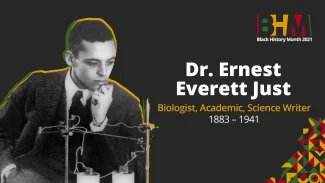We feel the beauty of nature because we are part of nature and because we know that however much in our separate domains we abstract from the unity of Nature, this unity remains. Although we may deal with particulars, we return finally to the whole pattern woven out of these.
Ernest Everett Just’s achievements in the fields of biology helped to change our understanding of the physiology of development, and many of his discoveries still form the building blocks of our knowledge of fertilisation and cells within development.
Born in Charleston, South Carolina in 1883, Just grew up and studied at at Kimball Union Academy (New Hampshire), completing a four year course in just three years, graduating with the highest grades in his class - with his mother passing away a year into his time at Kimball. He then graduated from Dartmouth College (New Hampshire) , where he first began learning about the intricacies of biology - more specifically egg development, and fertilisation.
Just was a star student at Dartmouth, with special honours in zoology, but was not chosen as the individual that would deliver the commencement speech due to the prejudice within his faculty against his race. His achievements were varied and impressive, however, with further honors in botany, sociology and history, and he was honored as a Rufus Choate Scholar. Upon graduating, Just took a position at Howard University, a historically Black institution, where he founded the first Black fraternity on campus alongside three students. He began his time at Howard teaching English, but as time passed in his career he became head of the Zoology department - a role he truly excelled in until his death in 1941.
Ernest Everett Just's reputation as a knowledgable expert in the field of marine eggs and embryos was impressive, and other researchers from around the USA were desperate to work with him. Much of his work was then also done at the Marine Biological Laboratory at Woods Hole Masachusetts, and at the University of Chicago. Frustrated by the extent of the racism in the USA, and the fact this restricted where he was able to work and carry out his research, Just began spending large amounts of time in Europe. During time working in Germany in 1933, Just had to leave immediately when Hitler came into power, and then moved his work to France. However, upon the German invasion of France in 1940, Just became imprisoned in a prison-of-war camp, and unfortunately preexisting illnesses deteriorated rapidly when he spent this time in horrendous conditions. Upon returning home with the assistance of the U.S. State Department, Dr. Just unfortunately passed away after a diagnoses of pancreatic cancer.
Throughout his life, Ernest Everett Just's incredible commitment to his work, and passion for science and research shone brilliantly, and this is reflected in his legacy today and the books he authored over the course of his life. He wrote two books entitled 'The Biology of the Cell Surface', and 'Basic Methods for Experiments on Eggs of Marine Animals', and since his death a book has been written about him - 'Black Apollo of Science: The Life of Ernest Everett Just' (Keith R. Manning). Multiple institutions also have symposiums hosted or prizes in his name.
